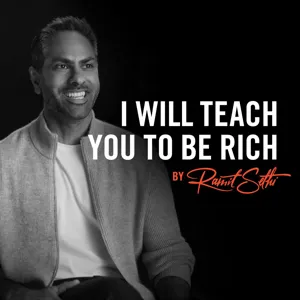Podcast Summary
Essential communication skills and avoiding investment mistakes: Focus on communication skills for success in life and business. In investing, avoid emotional attachment and use the overnight test to make rational decisions.
Strong communication skills are essential in business and life, and the Think Fast, Talk Smart podcast can help you hone these skills. Meanwhile, when it comes to investing, it's important to remember that the market often beats us, as best-selling author Carl Richards emphasizes in his book, The Behavior Gap. Instead of trying to outsmart the market, we often make mistakes ourselves. To avoid emotional attachment to investments, Richards suggests using the overnight test: if you wouldn't buy a stock the next day with the same information, then you probably shouldn't buy it now. By focusing on our own behavior and communication skills, we can make better decisions and achieve success in various aspects of our lives.
Assessing investments regularly and using the 'overnight test': Regularly review investments, avoid emotional attachments, use 'overnight test' to check suitability, and avoid buying high, selling low.
It's essential to regularly review and assess your investments instead of holding onto them indefinitely based on emotional attachments. The "overnight test" is a helpful exercise to determine if your investments are still appropriate for your future financial plan. Plans may be worthless due to the numerous assumptions involved, but the process of planning is invaluable. The single dumbest mistake investors make is buying high and selling low, which goes against the key principle of buying low and selling high. It's crucial to avoid this common pitfall and stay disciplined in your investment strategy.
Considering Stock Investments: Individual Research vs Index Funds: Determine resources for stock research, consider index funds for efficient exposure, establish financial goals before selling stocks, and understand financial planner compensation.
When it comes to investing in stocks, individuals should consider whether they have the time and resources to research individual stocks effectively, or if they would benefit more from investing in index funds. When deciding to sell a stock, individuals should first establish financial goals and determine their desired equity exposure. Once this is determined, the most efficient way to achieve this exposure is often through index funds. For those seeking to work with a financial planner, it's important to understand how the planner is compensated to ensure alignment of interests. These are just a few of the key considerations discussed during the conversation between Carl Richards and the hosts of Motley Fool Money.
Considering a Financial Advisor?: Look for independence, fiduciary duty, references, and check SEC records. For investment success, be fearful when others are greedy, greedy when others are fearful, and understand your finances.
When selecting a financial advisor, it's essential to consider their independence, willingness to act as a fiduciary, and past references. Independence means they aren't influenced by external factors, and acting as a fiduciary means putting the client's interests above their own. References can provide valuable insights into the advisor's experience and performance. Additionally, checking the SEC's website for any disciplinary actions is a crucial final step. Regarding Warren Buffett's investment success, the key takeaway is his ability to be fearful when others are greedy and greedy when others are fearful, along with his unique talent and disciplined approach. For individuals looking to improve their finances, making a commitment to understand their current financial situation and building a personal balance sheet are crucial first steps.
The Importance of Staying Open and Aware: Staying open to new information, aware of biases, and having honest conversations about money and other important topics can lead to better understanding and clarity.
Our perception and awareness of the world around us may be limited, and we often miss important information even when it's right in front of us. This was demonstrated in an experiment called the "Invisible Gorilla" where participants failed to notice a gorilla walking through a basketball video. This phenomenon, known as inattentional blindness, highlights the importance of staying open to new information and being aware of our own biases and assumptions. Another key takeaway from the discussion is the importance of having open and honest conversations about money with loved ones. Many people grew up in households where money was a taboo topic, but having these discussions can help clarify financial situations and set common goals. Additionally, the discussion touched on the idea that there are some areas of knowledge where it's possible to know the limits of what we know, such as weather forecasting. However, in other areas, like investing, having too much information may not always be beneficial and can lead to overthinking and analysis paralysis. Overall, the conversation emphasized the importance of staying curious, being aware of our own biases, and having open and honest conversations about important topics.
Overconfidence can lead to incorrect assumptions: Overconfidence can result in poor decision-making, even in fields where feedback is readily available, leading to potential losses in areas like investing or managing others' money.
Overconfidence can lead individuals, whether they are chess players or criminals, into making incorrect assumptions about their abilities. In the case of weather forecasts, they are not 100% accurate, but they are aware of their limitations and generally correct around 75% of the time. However, some individuals, such as hedge fund managers, can make large bets based on their beliefs about market directions, which can lead to significant losses. Similarly, criminals, like McArthur Wheeler, can exhibit overconfidence in their abilities, leading them to make mistakes, such as attempting to rob banks without a disguise. Even in fields where feedback is readily available, such as chess, individuals can still overestimate their skills. This overconfidence can lead to poor decision-making, particularly in areas like investing or managing other people's money.
Less information leads to better investment results: Infrequent feedback can help investors avoid emotional reactions to market volatility and make better long-term decisions
Less information about investment performance may lead to better long-term results, as shown in an experiment by behavioral economist Richard Thaler. This counterintuitive finding is due to the fact that frequent feedback can cause investors to react emotionally to short-term market volatility, leading them to make suboptimal decisions. For instance, those who moved their money from a stock fund to a bond fund after suffering large losses missed out on the benefits of the stock market's long-term growth. Investing can be compared to a game of poker, where both skill and chance are involved. While it's important to make informed decisions, investors should also strive to control their emotions and think long-term, just as a skilled poker player does. Lastly, while snap judgments can be useful in some situations, they are overrated in investing, as they often overlook important information and can lead to impulsive decisions.
Intuition vs. Rational Analysis: Intuition can be effective in certain situations, but it's important to balance it with rational analysis to avoid overconfidence and negative consequences.
While intuition and confidence are valuable, they should not be relied upon exclusively in all situations. The example of Lehman Brothers' president illustrates how trusting one's gut instincts can be effective in certain circumstances, but it's important to balance intuition with rational analysis. Trump's confidence is another example of the power of illusion of confidence. However, there can be too much of a good thing, and overconfidence can lead to negative consequences. Intuition plays a significant role in various aspects of life, such as love and relationships, but it's crucial to understand its limitations and use it wisely, especially when dealing with day-to-day matters involving communication and memory. In these situations, it's essential to be sensitive to emotions and aware of potential assumptions and biases.
Intuitions Deceive Us in Investing: Avoid letting emotions and biases influence investment decisions, imagine starting with no portfolio, and defy logic for unexpected benefits.
That our intuitions and beliefs about ourselves and the world around us can lead us astray, particularly when it comes to investing. The authors of "The Invisible Gorilla and Other Ways Our Intuitions Deceive Us" warn against overestimating our own knowledge and memory, as well as our ability to predict the future. Instead, investors should try to avoid letting emotions drive their decisions and resist the status quo bias. To do this, Dan Ariely suggests imagining that you have no portfolio and then deciding what you would do with your cash. This can help alleviate the pain of selling losing stocks and allow you to make more rational investment decisions. The authors also emphasize the importance of defying logic at times, as unexpected benefits can often arise from going against the norm.
Impact of work structures on employees' morale and productivity: Bonuses can backfire for cognitive tasks, people become attached to their ideas, and disassembling work can demotivate, affecting morale and productivity
People can behave irrationally at work despite appearing functional. Bonuses, for instance, can be effective for physical tasks but can backfire for cognitive tasks. People also tend to become overly attached to their ideas and may be demotivated when their work is discarded, even if they enjoyed the process. To illustrate this, an experiment was conducted involving building Lego robots, where participants were paid less for each subsequent build. In the condition where the Legos were not disassembled, participants persisted longer and enjoyed the task more. However, when the Legos were disassembled after each build, participants stopped working much faster. This demonstrates how the meaning and joy of labor can be easily squished, even in seemingly insignificant tasks. Employers have the power to foster intrinsic motivation or crush it, making it essential to consider the impact of work structures on employees' morale and productivity.
Understanding human behavior in the workplace and relationships: Emphasize meaning in work, use focus groups wisely, and recognize the limitations of monogamy. Maintain open communication in relationships.
Key takeaway from the discussion with Dan Ariely on Motley Fool Money is the importance of helping employees find meaning in their work and understanding the biological factors that influence human behavior, such as the use of focus groups and the concept of monogamy. Ariely emphasized that people have a natural inclination to create meaning in their labor, but it's crucial for workplaces to explain the value and connection of their tasks without crushing their sense of meaning. He also discussed the limitations of focus groups and the role of oxytocin in controlling monogamy, suggesting that people are more non-monogamous than we admit. Lastly, Ariely advised against telling one's spouse they're being irrational, as it's essential to maintain open and respectful communication in relationships. Overall, the discussion highlights the importance of recognizing the irrational aspects of human behavior and using that knowledge to improve various aspects of our lives.





